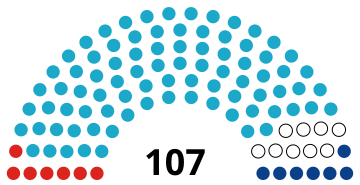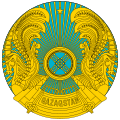| This article needs additional citations for verification. Please help improve this article by adding citations to reliable sources. Unsourced material may be challenged and removed. Find sources: "Politics of Kazakhstan" – news · newspapers · books · scholar · JSTOR (March 2012) (Learn how and when to remove this message) |
The politics of Kazakhstan takes place in the framework of a semi-presidential republic, whereby the President of Kazakhstan is head of state and nominates the head of government. Executive power is exercised by the government. Legislative power is vested in both the government and the two chambers of parliament.
None of the elections held in Kazakhstan have been considered free or fair by Western standards with issues noted including ballot tampering, multiple voting, harassment of opposition candidates and press censorship.
Executive branch
Main article: Government of Kazakhstan| Image | Post | Name | Party | Term |
|---|---|---|---|---|

|
President | Kassym-Jomart Tokayev | Independent | 20 March 2019 |

|
Prime Minister | Oljas Bektenov | Amanat | 6 February 2024 |
The president is elected by popular vote for a five-year term. The prime minister and first deputy prime minister are appointed by the president. Council of Ministers is also appointed by the president. President Nazarbayev expanded his presidential powers by decree: only he can initiate constitutional amendments, appoint and dismiss the government, dissolve Parliament, call referendums at his discretion, and appoint administrative heads of regions and cities.
The president is the head of state. He also is the commander in chief of the armed forces and may veto legislation that has been passed by the Parliament. President Nursultan Nazarbayev, who was in office since Kazakhstan became independent, won a new 7-year term in the 1999 election that the Organization for Security and Cooperation in Europe said fell short of international standards. A major political opponent, former prime minister Akezhan Kazhegeldin, was prohibited from running against the president because he had attended an unauthorized meeting of "the movement for free elections". On top of this the election was unconstitutionally called two years ahead of schedule. Free access to the media is also denied to opposing opinions. In 2002 a law set very stringent requirements for the maintenance of legal status of a political party, which lowered the number of legal parties from 19 in 2002 to 8 in 2003. The prime minister, who serves at the pleasure of the president, chairs the Cabinet of Ministers and serves as Kazakhstan's head of government. There are three deputy prime ministers and 16 ministers in the Cabinet. Bakhytzhan Sagintayev became the Prime Minister in September 2016.
Legislative branch
The legislature, known as the Parliament (Parliament), has two chambers. The Lower House Assembly (Mazhilis) has 107 seats, elected for a four-year term, 98 seats are from party lists, 9 - from Assembly of People. All MPs are elected for 5 years. The Upper House Senate has 47 members, 40 of whom are elected for six-year terms in double-seat constituencies by the local assemblies, half renewed every two years, and 7 presidential appointees. In addition, ex-presidents are ex officio senators for life. Majilis deputies and the government both have the right of legislative initiative, though most legislation considered by the Parliament is proposed by the government. Several deputies are elected from the Assembly of People of Kazakhstan.
Judicial branch
There are 65 judges on the Supreme Court of Kazakhstan. There are seven members of the Constitutional Council. Out of the 7 members, 3 are appointed by the president.
There are local and oblast (regional) level courts, and a national-level Supreme Court. Local level courts serve as courts of first instance for less serious crimes such as theft and vandalism. Oblast level courts hear more serious criminal cases and also hear cases in rural areas where no local courts have been established. A judgment by a local court may be appealed to the oblast level. The Supreme Court is a cassation court that hears appeals from the oblast courts.
The constitution establishes a seven-member Constitutional Council to determine the constitutionality of laws adopted by the legislature. It also rules on challenges to elections and referendums and interprets the constitution. The president appoints three of its members, including the chair.
Under constitutional amendments of 1998, the president appoints a chairperson of a Higher Judicial Council, which nominates judges for the Supreme Court. The Council consists of the chairperson of the Constitutional Council, the chairperson of the Supreme Court, the Prosecutor General, the Minister of Justice, senators, judges, and other persons appointed by the president. The president recommends and the Senate (upper legislative chamber) approves these nominees for the Supreme Court. Oblast judges (nominated by the Higher Judicial Council) are appointed by the president. Lower level judges are appointed by the president from a list presented by the Higher Judicial Council. Under legislation approved in 2000, judges serve for life.
Political parties and elections
For other political parties, see List of political parties in Kazakhstan. An overview on elections and election results is included in Elections in Kazakhstan. Main article: 2019 Kazakh presidential electionEarly presidential elections were held in Kazakhstan on 9 June 2019 following the resignation of long-term president Nursultan Nazarbayev. Originally scheduled for 2020, seven candidates were registered to participate in the elections, including incumbent president Kassym-Jomart Tokayev, who had assumed the presidency three months before the elections following the resignation of Nazarbayev. Tokayev was subsequently re-elected with 71% of the vote. His closest challenger, Amirjan Qosanov of the Ult Tagdyry party, received 16%.
| Candidate | Party | Votes | % | |
|---|---|---|---|---|
| Kassym-Jomart Tokayev | Nur Otan | 6,539,715 | 70.96 | |
| Amirjan Qosanov | Ult Tagdyry | 1,495,401 | 16.23 | |
| Dania Espaeva | Ak Zhol Democratic Party | 465,714 | 5.05 | |
| Toleutai Raqymbekov | Auyl People's Democratic Patriotic Party | 280,451 | 3.04 | |
| Amangeldi Taspihov | Federation of Trade Unions | 182,898 | 1.98 | |
| Jambyl Ahmetbekov | Communist People's Party | 167,649 | 1.82 | |
| Sadibek Tügel | Uly Dala Qyrandary | 84,582 | 0.92 | |
| Total | 9,216,410 | 100.00 | ||
| Valid votes | 9,216,410 | 99.38 | ||
| Invalid/blank votes | 57,700 | 0.62 | ||
| Total votes | 9,274,110 | 100.00 | ||
| Registered voters/turnout | 11,960,364 | 77.54 | ||
| Source: CEC | ||||
 | |||||
|---|---|---|---|---|---|
| Party | Votes | % | Seats | +/– | |
| Nur Otan | 6,183,757 | 82.20 | 84 | +1 | |
| Aq Jol | 540,406 | 7.18 | 7 | –1 | |
| Communist People's Party | 537,123 | 7.14 | 7 | 0 | |
| Auyl People's Democratic Patriotic Party | 151,285 | 2.01 | 0 | 0 | |
| Nationwide Social Democratic Party | 88,813 | 1.18 | 0 | 0 | |
| Birlik | 21,484 | 0.29 | 0 | New | |
| Members elected by the Assembly of People | 9 | 0 | |||
| Total | 7,522,868 | 100.00 | 107 | 0 | |
| Valid votes | 7,522,868 | 99.43 | |||
| Invalid/blank votes | 43,282 | 0.57 | |||
| Total votes | 7,566,150 | 100.00 | |||
| Registered voters/turnout | 9,810,852 | 77.12 | |||
| Source: CEC, CEC | |||||
International organization participation
In 1999, Kazakhstan applied for observer status at the Council of Europe Parliamentary Assembly. The official response of the Assembly was that Kazakhstan could apply for full membership, because it is partially located in Europe, but that they would not be granted any status whatsoever at the Council until their democracy and human rights records improved. Improvement in these areas has been made for in 2012, Kazakhstan was elected by United Nations members to serve on the UN Human Rights Council. Despite this, Kazakhstan is still considered to have a very poor human rights record by analysts such as The Economist Intelligence Unit.
AsDB, CIS, EAPC, EBRD, ECE, ECO, ESCAP, FAO, IAEA, IBRD, ICAO, IDA, IDB, IFAD, IFC, IFRCS (associate), ILO, IMF, IMO, Interpol, IOC, IOM, ISO, ITU, NAM (observer), NSG, OAS (observer), OIC, OPCW, OSCE, PFP, SCO, UN, UNCTAD, UNESCO, UNIDO, UPU, WCL, WFTU, WHO, WIPO, WMO, WToO, WTrO (observer)
See also
Further reading
- Junisbai, Barbara (2025). The Pitfalls of Family Rule: Patronage Norms, Family Overreach, and Political Crisis in Kazakhstan and Beyond. Cornell University Press.
References
- Pannier, Bruce (2015-03-11). "Kazakhstan's long term president to run in snap election – again". The Guardian. ISSN 0261-3077. Retrieved 2020-03-15.
- Chivers, C.J. (6 December 2005). "Kazakh President Re-elected; voting Flawed, Observers Say". The New York Times. Retrieved 2 April 2014.
Kazakhstan has never held an election that was not rigged.
- "Официальный сайт Парламента Республики Казахстан". www.parlam.kz.
- Alexei Trochev (2017). "Between convictions and reconciliations: Processing criminal cases in Kazakhstani courts" (PDF). Cornell International Law Journal. 50. Retrieved 2 September 2020.
- Republic of Kazakhstan, Embassy. "Kazakhstan Democracy". Retrieved 2 April 2014.
- Kazakhstan to hold early presidential election on June 9 Archived 2019-04-09 at the Wayback Machine Al Jazeera, 9 April 2019
- "Results of the election of 18 members of the Human Rights Council held on 12 November 2012". United Nations.
- "EIU Democracy Index 2018 - World Democracy Report". www.eiu.com.
External links
- Will Kazakhstan Be Next? - On Political Developments in Kazakhstan by the Carnegie Endowment for International Peace
- Central Asia Commerce
| Kazakhstan articles | ||||||||||
|---|---|---|---|---|---|---|---|---|---|---|
| History |
|  | ||||||||
| Geography |
| |||||||||
| Politics | ||||||||||
| Economy | ||||||||||
| Culture |
| |||||||||
